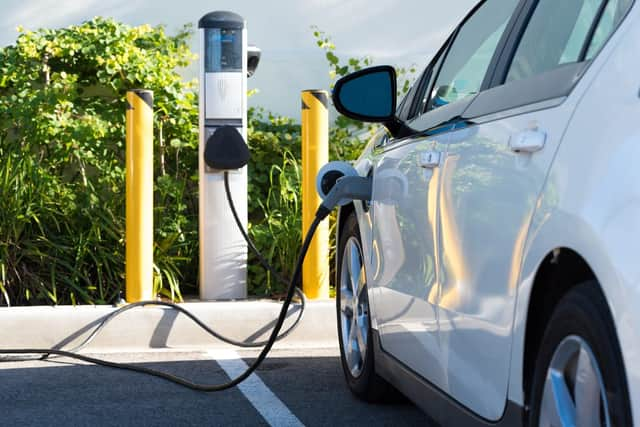Petrol and diesel car prices could jump by £1,500 to subsidise EVs


As much as £1,500 could be added to the price of new petrol and diesel cars to help subsidy electric car purchases under plans being considered by the Government.
The Department for Transport is considering a so-called “feebate” scheme which would see the buyers of more polluting vehicles charged more and that money used to help bring down the cost of EVs.
Advertisement
Hide AdAdvertisement
Hide AdA DfT report into encouraging more drivers to opt for electric cars suggests that the feebate approach could be one of the quickest and most effective methods of persuading drivers to switch to an EV.
However, the suggesting has been criticised by the car industry and the body which represents car makers and dealers in the UK has warned that penalising drivers could backfire on the Government.
The Government wants to accelerate the uptake of EVs ahead of a planned ban on the sale of new petrol and diesel cars by 2035. However, despite a rapid increase in interest, the still represent just five per cent of the new car market.
In order to speed this up, the DfT commissioned a report to examine ways to encourage more buyers to switch from fossil fuel vehicles to EVs.
Advertisement
Hide AdAdvertisement
Hide AdIt suggests a "carrot and stick" approach as used in countries such as France and Sweden could change attitudes. The report says: "A Feebate system could be used in the UK to supplement or replace the existing Plug-in Grants (PiGs) (offering a stronger incentive to consumers) and at the same time disincentivise purchase of ICEVs."
Among other suggestions are a VAT discount on new EVs, making it mandatory for petrol stations to install charging points and incentivising other public places such as shops and tourist destinations to install their own chargers. The report also suggested making it compulsory for a standard price labelling system to make clear the total cost of EV ownership, and painting EV-specific parking spaces green to make the benefits more obvious to drivers.


Transport Minister Grant Shapps said that several of the report’s suggestions, including the painted parking spaces, installing chargers at tourist destinations and creating dedicated EV retail sites could form part of the Government strategy in future.
However, the idea of charging some drivers more in order to subsidise others is likely to prove more controversial than painting parking spaces.
Advertisement
Hide AdAdvertisement
Hide AdMike Hawes, chief executive of the Society of Motor Manufacturers and Traders (SMMT) said such a move could have a negative impact on the shift towards electric vehicles.
He said: “We need positive measures, not those that penalise consumers who cannot yet afford the latest electric technology, do not have adequate charging facilities, or for whom driving requirements are not suited to electrification.
“To do otherwise could risk stalling fleet renewal and delaying environmental improvements by leaving them with no alternative but to keep their older vehicle for longer.”